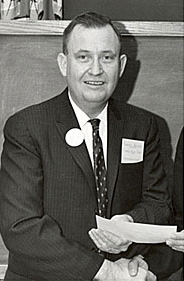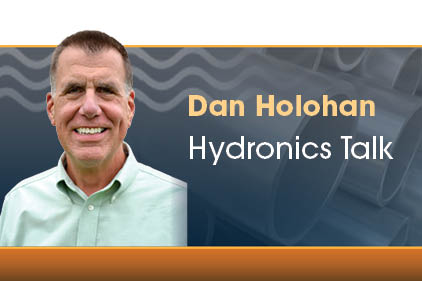
|
I never got to meet Charlie Horton, the founder of this fine magazine and probably the best PHC editorialist ever to pluck at a typewriter.
I came on board just after he died. Plumbing & Mechanical magazine, also started by Mr. Horton, was new and they asked me to write some columns for them. I also had started doing a bit of writing for Supply House Times at the request of John O’Reilly, one of the best editors in the business. He taught me a lot.
When I visited the old Horton Publishing company for the first time John took me in to meet Mrs. Horton, who was sitting at Mr. Horton’s desk. I thought I was a big-shot writer at the time and there I was, about to meet the boss. John introduced me and I gushed on for a while about how great it was to work for her and how much I loved writing for their magazines.
When I finally stopped to take a breath, I figured she would use the opportunity to tell me how wonderful it was to have me on board. I could then leave her office all proud and puffed up. I smiled. She smiled back. And then she asked, “What exactly do you do for us?”
Mr. Big-Shot Writer.
I get it now, though. She had been married to Mr. Horton and he was as good as it got when it came to working in the Paragraph Factory and talking straight about what was to come in our industry. That gentleman had a remarkable way with words and there’s nothing I’ve ever written that has come even close. I couldn’t hold his coat.
A hot opportunity
Going through some old papers the other day, I came across an editorial Mr. Horton wrote in the spring of 1980. The title was “Energy Conservation — Our Hot New Opportunity.” Here’s some of what he had to say more than 33 years ago:
“We are now in the sixth year of the ‘Energy Crisis’ that started with the Arab oil embargo in the fall of 1974. For a long time it appeared that consumer demand for energy was not ‘price elastic,’ meaning usage was not significantly influenced by price. Even though the cost of all forms of energy continually increased, the public showed little inclination to make any major changes in its lifestyles, product preferences and buying habits.
“But then came the series of tremendous increases in the price of imported oil over the past 12 months and with it clear and convincing evidence that energy demand is indeed ‘price elastic’ — past a certain price.”
And didn’t that prove to be true? Mr. Horton goes on in the editorial to note the most startling evidence was that the sharply higher prices were affecting consumer attitudes and habits toward big cars. “Overnight, the American automobile industry found itself trapped in a fundamental change of consumer preference, three to five years ahead of what had been anticipated. Larger models that sold well early in the year were virtually unsalable in the fall, even with big rebates.”
Which, of course, opened the door for the Japanese carmakers, and all that followed. Mr. Horton mentions in his editorial that this represented “a reduction in the standard of living, a proposition entirely contrary to our national experience and psychology.”
I think time, the Cadillac Escalade, the Ford Expedition and the Hummer proved him right.
Finding solutions
From there, he shifts to energy use in homes: “The lowering of the standard of living represented by the small economy car is only occasional, and to some extent theoretical. For one person making a five-mile trip, it is not lowering at all. But there is nothing occasional or theoretical about a 60° F thermostat setting in winter or an 80° F setting in summer, or using less hot water. This is a form of energy conservation the public will not accept, and should not because it would be an appalling reduction in the standard of living for every member of the family, all the time.”
Which made me think back to Jimmy Carter and his Mr. Rogers sweater. He told us we were a nation suffering from malaise and we needed to bundle up. This didn’t sit well with many Americans.
If you’re old enough, consider all that’s happened during the past 33 years and then listen again to what Mr. Horton saw coming:
“(Americans) aren’t willing to go backward 50 years in their quality of life, and don’t have to. That’s not the American way to deal with a problem. Our response has always been to find solutions. Our national genius is to develop and market reliable, sensible devices that reduce labor and cost; in this instance, products that will conserve energy, and therefore reduce cost, but at no penalty to the quality of life.
“But how that has changed just in the past couple of years, and it’s just now getting started. In the decade of the 1980s, these products will become major contributors to sales volume and profits of all wholesalers and dealers.
“There is nothing futuristic about this emerging market. The market is here and the opportunity is now.”
He goes on to mention the lineup of products we had available in 1980. We’re ripping out most of that stuff these days. We’ve made incredible advances in technology during the past 33 years, and what dazzled Mr. Horton (and me) back then looks terrible by comparison now. But it was as good as it got in 1980.
And then he wrote this:
“It is the nature of this industry to resist ‘new products’; to wait until such time as ‘demand develops’; to be afraid of the ‘expensive’ product when something cheaper is available. It would be tragic if, in this instance, we followed those ancient, negative impulses.
“These products are not new; only the opportunity to sell them in volume is new. The demand does not have to develop; it is already there and has now become imperative. They are not expensive. How can a product that saves 15% to 34% of energy consumption, that pays back its entire cost in two or three years, be called expensive? The ‘cheaper’ products are the most expensive ones today.
“The tremendous increases in energy prices over the past six years have changed the whole world in fundamental ways. It can be a better world for our industry if we take advantage of the opportunity it has presented; nay forced upon us!”
How I wish I was perhaps a year older and could have met this man. And if he asked me, as his wife once did, “What exactly do you do for us?” I might have answered: “I’m here to remember you, sir. I’m here to remember the wisdom and the brutal honesty that you brought to this industry. It’s as true today as it was then. And thanks for giving me the opportunity to say that.”
HELPFUL LINKS:
- HeatingHelp.com
- Contact Supply House Times
- Follow Supply House Times on Twitter!
- Find Supply House Times on Facebook!



